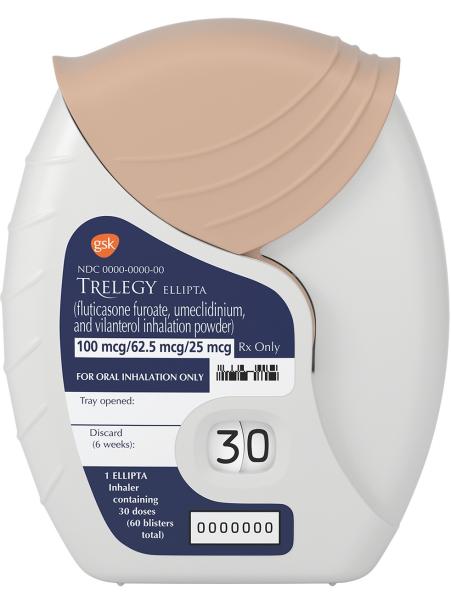Trelegy Ellipta Interactions
There are 529 drugs known to interact with Trelegy Ellipta (fluticasone/umeclidinium/vilanterol), along with 13 disease interactions, and 2 alcohol/food interactions. Of the total drug interactions, 54 are major, 457 are moderate, and 18 are minor.
- View all 529 medications that may interact with Trelegy Ellipta
- View Trelegy Ellipta alcohol/food interactions (2)
- View Trelegy Ellipta disease interactions (13)
Most frequently checked interactions
View interaction reports for Trelegy Ellipta (fluticasone / umeclidinium / vilanterol) and the medicines listed below.
- albuterol
- amlodipine
- aspirin
- atorvastatin
- carvedilol
- Eliquis (apixaban)
- famotidine
- fluticasone nasal
- furosemide
- gabapentin
- hydrochlorothiazide
- levothyroxine
- lisinopril
- losartan
- metformin
- metoprolol
- montelukast
- omeprazole
- pantoprazole
- potassium chloride
- prednisone
- rosuvastatin
- Singulair (montelukast)
- tamsulosin
- tramadol
- trazodone
- Ventolin HFA (albuterol)
- Vitamin B12 (cyanocobalamin)
- Vitamin C (ascorbic acid)
- Vitamin D3 (cholecalciferol)
Trelegy Ellipta alcohol/food interactions
There are 2 alcohol/food interactions with Trelegy Ellipta (fluticasone / umeclidinium / vilanterol).
Trelegy Ellipta disease interactions
There are 13 disease interactions with Trelegy Ellipta (fluticasone / umeclidinium / vilanterol) which include:
- milk protein allergies
- cardiovascular
- diabetes
- hypokalemia
- seizures
- anticholinergic effects
- hepatic impairment
- infections
- ocular herpes simplex
- ocular toxicities
- osteoporosis
- hyperadrenocorticism
- severe liver impairment
More about Trelegy Ellipta (fluticasone / umeclidinium / vilanterol)
- Trelegy Ellipta consumer information
- Compare alternatives
- Pricing & coupons
- Reviews (253)
- Drug images
- Side effects
- Dosage information
- Patient tips
- During pregnancy
- Support group
- FDA approval history
- Drug class: bronchodilator combinations
- En español
Related treatment guides
Drug Interaction Classification
| Highly clinically significant. Avoid combinations; the risk of the interaction outweighs the benefit. | |
| Moderately clinically significant. Usually avoid combinations; use it only under special circumstances. | |
| Minimally clinically significant. Minimize risk; assess risk and consider an alternative drug, take steps to circumvent the interaction risk and/or institute a monitoring plan. | |
| No interaction information available. |
Further information
Always consult your healthcare provider to ensure the information displayed on this page applies to your personal circumstances.


